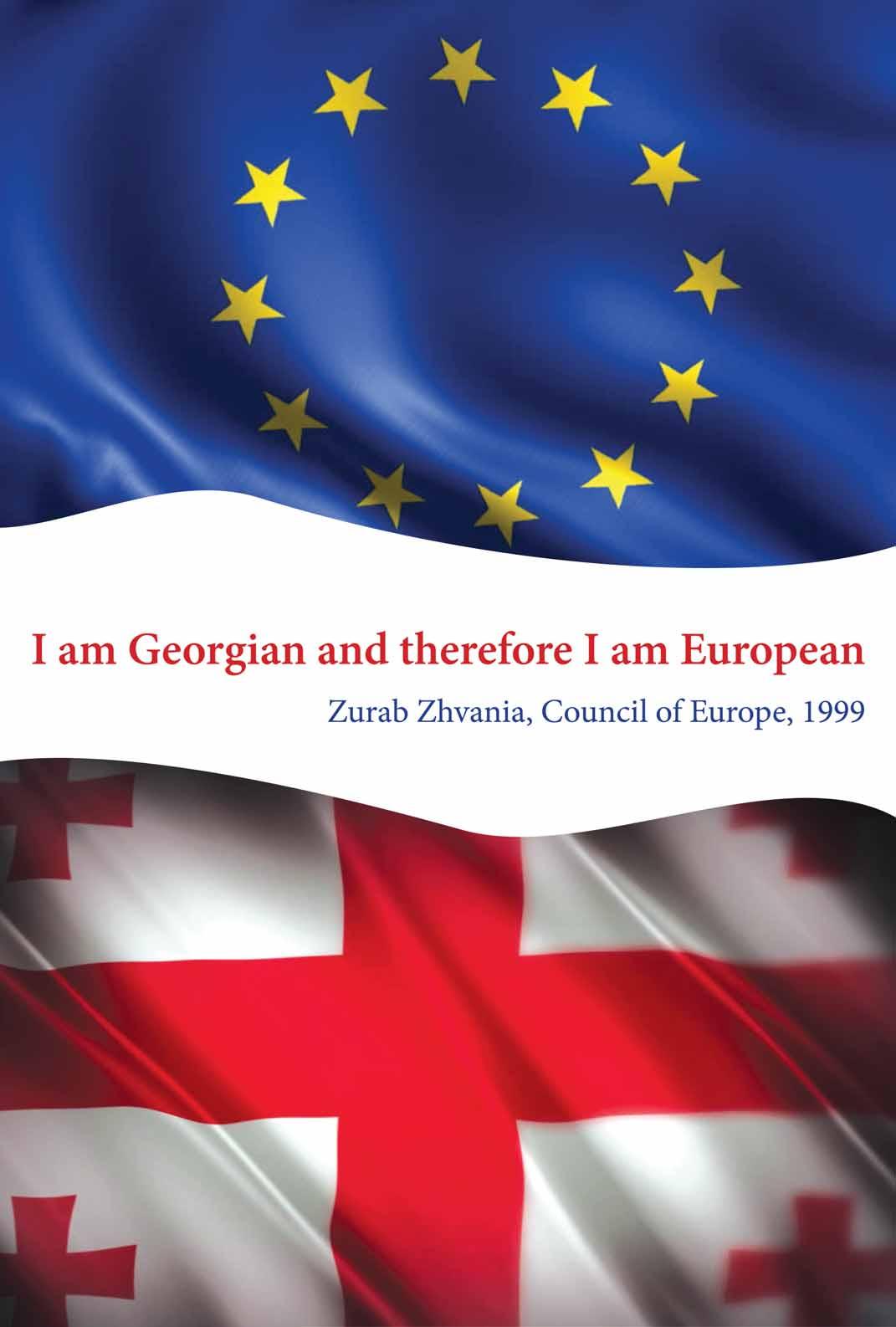FOCUS ON CARREFOUR FRANCHISING OPPORTUNITIES

PAGE 9


PAGE 9
 BY MARIAM GORKHELASHVILI
BY MARIAM GORKHELASHVILI
August 1 marked a momentous day in Georgia's telecommunications landscape as Cellfie Mobile, a leading Georgian mobile operator with 1.45 million customers, announced a significant collaboration with Nokia, the world's technology powerhouse. The partnership entails the renewal and modernization of the existing 4G network and the introduction of cutting-edge 5G technology across the country. This landmark agreement promises to provide high-quality internet, seamless coverage, and enhanced mobile capabilities for Georgian customers.
"This deal provides a significant improvement in the quality of the network, which our customers have been waiting for," says Vasil Berishvili, CEO of Cellfie Mobile.
In this week’s issue...
Russia Must Stop Using Food as a Weapon
NEWS PAGE 2
MEP Cramon Slams Georgian Gov’t for Establishing Strategic Partnership with China
POLITICS PAGE 3
Georgians Speak Out against Rising Russian Immigration and Tourism
POLITICS PAGE 4
Juraj Mesik on His Latest Book: “2023: The Year the Russian Empire Died”
POLITICS PAGE 5
The Greater Black Sea Region in the Contemporary Context: A Frank Conversation. Part 2
POLITICS PAGE 6
Legal Insights with Klein Law: Buying a Flat in an Unfinished Residential Development in Georgia
BUSINESS PAGE 7
EU report: Overall, Georgia Has a Solid Human Rights Framework – Further Efforts Still Needed in the Area of Judicial Reforms
SOCIETY PAGE 10
Georgia to Boost Winter Tourism with Two New Ropeways in Gudauri
posals to work to address its concerns. In order to shift blame, Russia claims that its own agricultural exports were not sufficiently facilitated. This is not borne out by publicly available trade data, which shows that Russia’s agricultural exports are thriving. Russia gained also important benefits from the Memorandum of Understanding with the UN on fertiliser exports, which had been brokered in parallel to the BSGI. The UN has worked relentlessly to clarify regulatory frameworks and engage with the private sector to find dedicated solutions across banking and insurance sectors. These efforts have been conducted in close collaboration with the EU and its partners.
BY JOSEP BORRELL FONTELLES, HIGH REPRESENTATIVE OF THE UNION FOR FOREIGN AFFAIRS AND SECURITY POLICY AND VICE-PRESIDENT OF THE EUROPEAN COMMISSION

On 17 July, nearly one year after it was signed in Istanbul, Russia decided to not renew the Black Sea Grain Initiative (BSGI) that allows Ukraine to export agricultural goods to global markets. As underlined by the Secretary General of the UN, this initiative has been ‘a beacon of hope in a world that desperately needs it’.
Before Russia’s war of aggression against Ukraine, a critical global food supplier, a fifth of the world’s barley came from Ukraine, as well as a sixth of the maize and an eighth of wheat. After Russia invaded Ukraine, attacking grain fields and silos and blocking Ukrainian ports, global food prices spiked to record levels and endangered much needed food supply for many importer countries. The BSGI aimed to re-establish a vital route for agricultural exports from Ukraine and to lower global food prices. Despite many challenges, it achieved its key purpose. Since August 2022, the export of almost 33 million tonnes of grains and food from Ukraine to 45 different countries played an instrumental role in reducing global food prices by
some 25% since the record high reached shortly after Russia’s attack. As public trade data shows, over half of the grain, including two thirds of the wheat, went to developing countries. In addition, the BSGI ensured continued access to grain for the World Food Programme (WFP). In 2023, Ukraine supplied 80% of the wheat procured to support humanitarian operations in the most food insecure countries like Afghanistan, Djibouti, Ethiopia, Kenya, Somalia, Sudan and Yemen. Without the Black Sea route, the WFP has to get its grain elsewhere at higher prices and with a longer lead-time at a time when the world is facing an unprecedented food crisis. Russia’s decision was taken despite the UN Secretary General’s renewed pro-
Contrary to the lies spread by Russia, the EU has indeed ensured that our sanctions have no impact on global food security. There are no sanctions on Russian export of food and fertiliser to third countries and the EU has provided extensive guidance to economic operators, clarifying that these transfers to third countries are permitted. We have also worked with the UN to allow related payments.
Despite these well-known and verifiable facts, Russia decided to pull out of the BSGI, using food as a weapon and endangering the global food supply. Hours after withdrawing from the initiative, Russia started also to destroy Ukraine’s grain storage facilities and port infrastructure with daily targeted attacks, not only in the Black Sea itself but also in the Danube. As an immediate reaction, wholesale wheat and maize prices saw their biggest increase since the start of Russia’s war of aggression. The increased food price volatility is likely to persist as long as Russia puts global food supply under deliberate
stress, aggravating the global cost-ofliving crisis and most acutely for foodinsecure people in import-dependent countries. This is unacceptable and should be resolutely condemned. As the world deals with disrupted supplies and higher prices, Russia is now approaching vulnerable countries, notably in Africa, with bilateral offers of limited grain shipments, pretending to solve a problem it created itself. This is a cynical policy of deliberately using food as a weapon.
In response to Russia's irresponsible actions, the EU is active along three main lines. First, we will continue to support the tireless efforts of the United Nations and Türkiye to resume the Black Sea Grain Initiative. Second, we continue to strengthen our “Solidarity Lanes” as alternative routes for Ukrainian agricultural exports to reach global markets through the EU. These lanes have allowed the export of more than 41 million tonnes of Ukraine’s agricultural goods so far, and we are increasing this as much as possible to mitigate the consequences of Russia’s termination of the BSGI. Third, we increased our financial support to countries and people most in need, providing €18 billion to address food security until 2024.
We call on the international community and all countries to step up their own assistance in support of global food security. We ask all our partners to urge Russia to return to negotiations as the African Union already did, as well as to refrain from targeting Ukraine’s agricultural infrastructure. With a clear and unified voice, we can get Russia to resume its participation to the BSGI. The world has a shared interest in responsible stewardship of global food security. We owe it to the people most in need.
This week, Ukraine’s air defenses shot down 23 drones during overnight attacks on the Kyiv and Odesa regions from Russia, the country’s military authorities said, while Russia struck ports and grain stocks in the country’s south, creating raging fires.
Russian drone strikes on ports in southern Ukraine early Wednesday morning destroyed or damaged nearly 40,000 tons of grain that was set for export to several African countries as well as China and Israel, Ukraine’s minister of infrastructure said.
“The Russians attacked warehouses and grain elevators - almost 40,000 tons of grain were damaged, which the countries of Africa, China, and Israel were waiting for,” Ukrainian infrastructure minister Oleksandr Kubrakov said, warning that such attacks were a threat to the world.
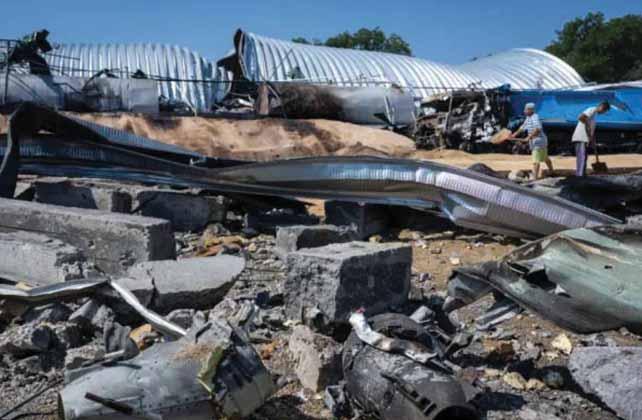
“The world must resist. Attacks on Ukrainian ports are a threat to the world,” he added, calling on the international community for more support as well as more provisions of air defense technology.
Russian President Vladimir Putin has agreed to visit Turkey, Turkish state media agency Anadolu said Wednesday
on the X social media platform, previously known as Twitter.
This followed a conversation with Turkish leader Recep Tayyip Erdogan, who has been striving to persuade Putin to return Russia to the Ukraine grain deal that Moscow abandoned in July.
The agreement, previously brokered by the UN and facilitated by Turkey, instated a humanitarian corridor that allowed the export of Ukrainian agricultural goods to the global markets to abate a
food crisis.
Erdogan described the initiative as a “bridge of peace” and emphasized it would not benefit any party to discontinue it. Russia has previously said that it would not rejoin the deal until its demands, dealing with restrictions on its own exports, are met.
The United States will take the helm of the United Nations Security Council for the month of August, a scheduled presidency that is expected to grapple with the fallout of the Black Sea Grain Initiative.
The landmark UN-brokered agricultural initiative between Ukraine and Russia collapsed last month triggering global food insecurity concerns.
US Ambassador to the United Nations
Linda Thomas-Greenfield slammed Moscow’s exit from the deal calling it “another blow to the world’s most vulnerable.”
The diplomatic choreography of assuming the role, largely seen as procedural, gives the US the opportunity to set the agenda for debates over the next month. Thomas-Greenfield is expected to focus on the defense of human rights and ways to mitigate food insecurity.
Russian opposition leader Alexei Navalny gave a closing statement to a Russian court after facing trial, during which he said that Russia was “floundering in a pool of either mud or blood,” and that the invasion of Ukraine was “the most stupid and senseless war of the 21st century.”
Navalny is currently serving a nineyear sentence and could face up to 20 more years in prison on charges that his supporters say are purely political. The Russian court will deliver its verdict on Friday.
In his closing statement to the court, the 47-year-old criticized Russia's military operation in Ukraine, which was followed by an unprecedented crackdown on critics of President Vladimir Putin's government.
"Around Russia lie tens of thousands of people killed in the most stupid and senseless war of the 21st century," Navalny told the court.
Prosecutors have requested a jail term of 20 years on charges that include the financing of extremist activity, publicly inciting extremist activities and "rehabilitating Nazi ideology".
While everyone else tries to become more economically independent from China, Georgia again takes another turn, MEP Viola Von Cramon ironically responded to the statements made about the visit of the Prime Minister of Georgia, Irakli Garibashvili, to China and the importance of the strategic partnership between the two countries.

“While everyone else tries to become more economically independent from China, Georgia again takes another turn. Helping Russia with circumventing the sanctions, deepening the economic ties with China, that all looks like the right turn towards Europe/EU … *irony off*”, the MEP tweeted.
Georgian Government Administration released a joint statement on the establishment of a strategic partnership between Georgia and China. The document comprises 4 domains: political, economic, people-to-people/cultural, and international.
The statement says that from July 26 to August 1, 2023, Irakli Garibashvili, Prime Minister of Georgia, attended the opening ceremony of the 31st Chengdu FISU World University Games in China. During the visit, President Xi Jinping met with Prime Minister Irakli Garibashvili in Chengdu and Premier Li Qiang met with the PM in Beijing.
The two sides had an in-depth exchange of views on bilateral relations and international and regional issues of mutual interest and reached a broad consensus.
The two sides decided to elevate bilateral relations to a strategic partnership. Both sides share the view that since the establishment of diplomatic relations between the two countries on June 9, 1992, bilateral cooperation has witnessed fruitful results in various fields. In the context of profound and complex evolution of the international and regional situation, both sides share the commitment to expanding cooperation in the political, economic and cultural fields, strengthening collaboration in international affairs, deepening bilateral relations, and safeguarding regional and world peace, stability and development together.
1. POLITICAL DOMAIN
1.1 The two sides reaffirm their respect for the sovereignty, independence and territorial integrity of all countries. Georgia firmly adheres to the one-China principle.
1.2 The two sides highlighted that given the current international order and economic globalization, the bilateral ties between China and Georgia have gained considerable importance. Both sides regard each other as an important strategic partner and thus regard the deepening of bilateral relations as a priority of their respective foreign policies.
1.3 Georgia believes that Chinese modernization offers a new path and a new option for mankind to achieve modernization. Both sides expressed their readiness to exchange experience in governance to achieve common development and prosperity.
1.4 The two sides are ready to strengthen high-level political consultations on issues of mutual interest and to enhance strategic mutual trust.
1.5 Both sides emphasized the necessity of expanding ties between central and local governments and political groups and parties to exchange experiences and strengthen interactions in various fields.
1.6 Considering the important role of cooperation between legislative bodies of both countries in the expansion and development of the bilateral ties, both sides emphasized the enhancement of exchanges and cooperation between the two countries’ legislative bodies in various fields and levels and communication and consultation in relevant regional and international organizations.
2. ECONOMIC DOMAIN
2.1 Both sides welcomed steady growth of bilateral trade in recent years and expressed readiness to further increase bilateral trade, optimize its structure, expand types of products and increase the export of Georgian goods and services to China.
2.2 Georgia welcomes the Belt and Road Initiative proposed by China. The two sides have signed documents including the Bilateral Cooperation Plan between the Government of the People’s Republic of China and the Government of Georgia under the Framework of the Belt and Road Initiative, to gain greater strengths and opportunities of cooperation. The two sides will strengthen policy coordination and synergy of development planning under the Belt and Road Initiative, deepen exchanges
and cooperation in various fields, uphold the principle of consultation and cooperation for shared benefits, and promote open, green and clean cooperation to realize goals of Belt and Road cooperation and promote sustainable development of both sides.
2.3 Both sides expressed readiness to facilitate mutual investment and trade and promote cooperation in the areas of transportation, communications, infrastructure modernization, development and strengthening of the Middle Corridor, digital technologies, manufacturing, upgrading and expansion of railway networks, agriculture and food safety, water resources, environment protection, fighting desertification, water desalination, conformity assessment, usage of Georgia’s transit infrastructure for smooth export of Chinese products to Western markets, the exchange of know-how and technology as well as human resource training.
2.4 The People’s Republic of China and Georgia have enjoyed a Free Trade Agreement since 2018, which played an important role in promoting economic and trade relations between the two countries. The two countries will continue to enhance their cooperation in the framework of the Agreement, support economic and commercial exchanges between the two countries’ institutions and companies based on mutual benefit, and actively explore the possibility of enriching the Agreement.
2.5 Both sides expressed their readiness for the next session of the ChinaGeorgia Economic and Trade Cooperation Commission to enhance information sharing in trade, investment, infrastructure and other topics of cooperation within the scope of the Commission, so as to enhance the quality and efficiency of bilateral exchanges.
2.6 China welcomes Georgia’s active participation in the China International Import Expo. China supports Georgian
enterprises in promoting their products via Chinese e-commerce channels.
2.7 Both sides expressed their readiness to intensify cooperation in tourism to promote common development of the sector. China welcomes Georgia to participate in travel exhibitions such as the annual China International Travel Mart.
2.8 China highlights the importance and supports the 4th Tbilisi Silk Road Forum themed “Connecting Today, Resilient Tomorrow”,which will take place in Tbilisi on October 26-27, 2023.
2.9 Georgia views cooperation between China and Central and Eastern European countries as a pragmatic, open and beneficial cross-regional cooperation platform. China welcomes Georgia’s interest in engaging in activities under the framework of this cooperative mechanism as an observer.
2.10 China will study the provisions of preferential loans for Georgia’s implementation of social and infrastructure projects.
3.1 Given the need to deepen bilateral relations under the new conditions, both sides expressed readiness to actively conduct scientific and technological cooperation and renew the agreement on cooperation in the field of science and technology signed between the People’s Republic of China and Georgia in 1993.
3.2 In view of their friendly relations and huge potential of cooperation in the people-to-people and cultural fields, the two sides agreed to enhance their cultural cooperation. They will encourage citizens to visit each other’s countries and strengthen cooperation in tourism, health, youth, and sports. In addition, they will also enhance their exchanges in the areas of film, press and public diplomacy.
3.3 The two sides will study the pos-

sibility of mutually designating cultural years, and continue their consultations regarding mutual establishment of cultural center and provide necessary facilitation.
3.4 The two sides will enhance their cooperation in science and higher education. They will promote exchange of teachers and students, strengthen cooperation in science and commercialization of new technologies and implement joint projects.
3.5 The two sides support universities in both countries in carrying out practical cooperation such as joint training programs, and encourage universities to make full use of high-quality digital education resources and combine online and offline channels for cooperation. The two sides will promote student exchange and joint cultivation by making good use of government scholarships and other channels.
3.6 Both sides attach importance to language exchange and cooperation, encourage schools of both countries to carry out Chinese and Georgian languages teaching, stand ready to strengthen exchanges and training of language teachers and support the building of Confucius Institutes (Classrooms).
4. INTERNATIONAL DOMAIN
4.1 The two sides will strengthen coordination and collaboration in regional and international affairs, jointly uphold true multilateralism, firmly uphold the UN-centered international system, the international order based on international law, and the basic norms governing international relations underpinned by the purposes and principles of the UN Charter, and promote the establishment of a new type of international relations.
4.2 The two sides support the promotion of humanity’s common values of peace, development, equity, justice, democracy and freedom, respect all people’s independent choice of development path suited to their national conditions, and promote the building of a community with a shared future for mankind.
4.3 Georgia supports the Global Development Initiative proposed by China and is ready to actively participate in cooperation under the Initiative to accelerate implementation of the UN 2030 Agenda for Sustainable Development.
4.4 Georgia supports the Global Security Initiative proposed by China. The two sides would like to strengthen exchanges and cooperation under the Initiative’s framework, make joint effort for a peaceful and stable international security environment, and promote and protect common development of countries in the region.
4.5 Georgia supports the Global Civilization Initiative proposed by China. The two sides will cooperate actively to implement this Initiative.
High-ranking security officials welcome Russian spies, set a table and take them on trips to secret facilities, – the third president of Georgia, Mikheil Saakashvili, wrote on social media.
According to him, Georgia’s secret maps and databases have been transferred to Russia.

“I would like to highlight some important details regarding visa-free travel to Russia:
“During my presidency, the visa-free period for Russian citizens was 3 months, patriots worked in our security services, and the Russian intelligence network in
Georgia was destroyed.
“The goal of visa-free travel was to make the Russians see what kind of successful state we are, not to believe Russian propaganda and to make them demand reforms in Russia, which were very important for the security of Georgia.
“They walked in our streets shocked and looked at the new Georgia.
“And now, high-ranking security officials welcome Russian spies, set a table and take them on trips to secret facilities.
“Even our secret maps and databases were given to Russia.
“Today, under the 1-year visa-free regime, Russian citizens start businesses
in Georgia both legally and illegally.
“They don’t pay taxes. Accordingly, services are offered to consumers at a lower price, meaning Georgian companies are deprived of their income and they occupy our jobs.
“Russian citizens in Georgia have created an autonomous system where they provide each other with various services, create closed networks, buy and rent real estate that is not available to Georgians and Georgian companies.
“With the help of corrupt schemes, they massively receive Georgian citizenship and buy Georgian lands, which is a particularly dangerous phenomenon,” Saakashvili wrote.
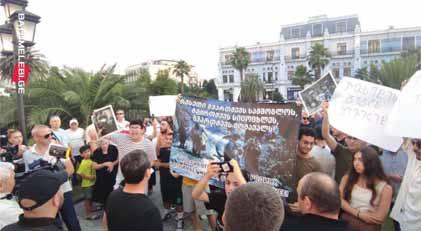
people here. These are only small groups, Nazis, who want war. Bad people are everywhere, there are no bad nations, there are bad people. No, I don’t think that 20% of Georgia is occupied. Russia has a good attitude towards Georgia. People come here and return with only good impressions,” one said.
“I know Abkhazia, I don't know the occupied territories. Abkhazia is not Georgia, nor is it Russia. I have been to Abkhazia, I talked to people, I was interested in their opinion, whether we are occupiers or not. They told me, Russians are good people, come, live here, travel. About five years ago, I was last in Abkhazia, on the border,” the same person added, seemingly unphased by the gravity of their words.
BY MICHAEL GODWINAs the sun waned on the horizon on Monday, July 31, the cries of “sa-kart-velo” rang out over the placid shores of Batumi. Slowly pulling away from the port was the hulking mass of the cruise ship Astoria Grande, laden with a legion of Russian tourists. For the second night in a row, the ship had been forced out of port earlier than scheduled by the crowds of Georgians gathering in the area.
According to members of this immense crowd, the cruise ship’s passengers, who were largely Russian citizens, were in favor of the Kremlin’s imperialist agenda and supported their country’s ‘special military operation’ in Ukraine. For some, this went as far as claiming that they were here to infiltrate Georgia and spread pro-Russian sentiments. While this may appear to be common conspiracy theory rambling, when the Russian passengers were allowed to disembark on the first visit, the reality was sobering.
“We don’t know about the occupation. You were a republic of ours, a union and not an occupied country,” one of the disembarking tourists claimed to local reporters. “Russia is not an occupier, what did we do, did we occupy you? We were helping you, we liberated Abkhazia
from you. They asked us to. I was in Abkhazia and I saw houses, all of them had broken windows. They were destroyed by you. Russia helped Abkhazia to get rid of you,” the tourist stated, much to the shock of the majority of the nation.
Outraged, many went to social media to sound the call for an increased presence at the port to oppose the presence of the Russians. Groups online quickly coordinated protests, with even students posting a Facebook event to “meet the occupiers,” saying “there is no place for the Russian ship in the port of Georgia.”
Armed with signs, flags, and colorful language, the groups converged on Batumi’s port as police scrambled to halt their advance.
While much of the first night went smoothly, there were still tense moments where protesters and police clashed. Indeed, 23 protesters were arrested and removed from the port. Despite this, several Russian tourists landed on Georgian soil to seek out their vacation fantasies, and as they walked off their ship, they found a curious media interest in their takes on the situation. Not willing to accept the humble tourist tradition of avoiding all things political, religious, and otherwise sensitive, they let fly with a volley of controversy.
“We are from Russia, from Novosibirsk. Georgia and Russia are good friends, we rest here, we like Georgia, there are good
Following this statement, along with others made in a similar fashion, Georgians took to social media to decry their presence. One of these is Rusudan Epadze, a communications expert and blogger at youth initiative group 16th Element.
“Russia's escalating influence on Georgia has reached concerning levels, permeating various aspects of Georgian society,” she writes.
Outlining the larger issue, she starts by saying “uncontrolled migration has contributed to an increase in apartment rental prices, rendering them unaffordable for a significant portion of Georgian citizens. The real estate market is also affected, with Russian buyers driving up prices, and with a lack of proper oversight on their acquisitions further exacerbating the issue.”
Epadze adds that along with this influx of Russian citizens, a significant number have started companies in Georgia “preferentially hiring their fellow citizens and evading taxes through informal financial channels.” Indeed, according to a Transparency International report released this month, since the start of the war in Ukraine, Russian citizens have founded 21,326 companies in Georgia, which is three times more than the previous 27-year figure. Most are individual enterprises. “This phenomenon has raised apprehensions due to its potential economic and social ramifications,” Epadze states.
“Adding to the sense of threat is the fact that approximately 20% of Georgian territory remains under Russian occupation, and instances of Russian troops kidnapping Georgian citizens continue to persist with little to no accountability for their actions, including incidents related to bodernization,” she adds.
Rusudan’s statements echo in a more refined way what many of her peers have been writing on social media. Georgian Dream and its supporters have taken to labeling the protesters as racists and xenophobic actors acting “on behalf of the opposition.” Interestingly, this is parallel to the statements made by Russian Foreign Ministry spokeswoman Maria Zakharova.
“Inside the country, this action had no support. We receive a large number of appeals from Georgian citizens who say that this boorish provocation is unacceptable for them, that they have nothing to do with it as a country, and who dissociate themselves from it,” Zakharova stated, echoing quips made by Georgian Dream senior leadership. Chairman of the ruling party Irakli Kobakhidze, in his standard coarse and unkempt fashion, called the protesters “boorish” and claimed that their behavior “is what caused the 2008 Russian invasion.”
Despite all of this, the resistance in Batumi held, and ultimately the ship was forced to leave early on both occasions.
In the end, the cruise line removed Batumi

from their schedule of port stops, though did not officially confirmed the reason for this action. While this is a victory for the protesters and their supporters, it is a sign of the stress being put on the population that has seen an estimated 222,274 people enter Georgia from Russia in that past year. Most sources put the number that stayed in the country around half of that number.
In Tbilisi, these tensions between Russian visitors and their Georgia would-be hosts have come to blows. Video circulating on social media shows young Georgian men and allegedly intoxicated Russians engaging in hand-to-hand combat in the streets of the capital, with some seeming to sustain considerable injuries. However, at the time of writing, there has been no confirmed wounds or arrests in these matters that, according to those posting on social media, stem from the Russian's comments about Georgia's status as a former Soviet Union state. The resistance to this so-called “Russification” of Georgia is unlikely to wane. As the ruling party takes less than admirable steps to placate not only the Kremlin but also the Russians that have made their home here, the Georgian citizenry are quickly going to find themselves in an uncomfortable position. In the words of Georgian President Salome Zurabishvili, “Russia is testing a second front today through ‘soft power,’ through propaganda.”
Since the war in Ukraine began, Iran and Turkey have played a crucial diplomatic and economic role for Russia to withstand the Western pressure. Moscow believed that the alignment with Ankara and Tehran could further expand due to developing geopolitical circumsntances.
Tehran and Moscow developed close ties in the military realm, with Iranian drones and potentially ballistic missiles being sent to Russia to shore its war effort. Moreover, the two have also expanded their economic ties through implementing the long-stalled northsouth corridor which effectively links Russia to the Global South as Moscow attempts to re-orient its trade from the West. In short, Iran and Russia have never been this close since the late 16th century, when both equally loathed the expanding Ottoman Empire.
Turkey has played a much nicer game, positioning itself as moderator between Ukraine and Russia, often hosting and facilitating various forms of negotiations between Moscow and Kyiv, whether through a grain deal or a prisoner swap. But Turkey also used Russia’s weaknesses and boosted its economy through tour-
ism and in various industries. Trade between the two countries skyrocketed. For Russia, Iran, and to a certain extent Turkey, were seen as actors which are much easier to cooperate with when it comes to Syria, the South Caucasus, the Caspian Sea and others. The understanding in Moscow was that this arrangement was of a long-term nature, and that the highly self-interested Iran and Turkey will only increase their cooperation with Russia.
This turned out to be a largely false belief. Recent weeks have showed that distrust between Russia and the two Middle East powers is very much alive, as are deep-seated disagreements. During the recent NATO summit in Vilnius, Turkey agreed to let Sweden into the alliance after months-long objections.
Ankara also allowed the Azov fighters to return to Ukraine, leading the Kremlin to blame Ankara of violating a deal signed last year after the fall of Mariupol
and imprisonment of Ukrainian fighters by Russian forces. The decision “goes against the terms of existing agreements,” the Russian president’s press secretary, Dmitry Peskov, said.
In another move, Ankara demanded that Russian peacekeeping forces leave the truncated Nagorno-Karabakh region in Azerbaijan in 2025, the date when its mandate officials ends. The venue – the Vilnius NATO summit – from which the Turkish president made this statement is telling. The long-running conflict in the South Caucasus is an arena where silent competition between Turkey and Russia has been unfolding.
With Iran, Moscow found itself in a difficult spot when, in July, Moscow and the Gulf Cooperation Council (GCC) states produced a statement which essentially questioned Iran’s claim over the three small islands (Greater Tunb, Lesser Tunb and Abu Musa) in the Gulf that are claimed by the United Arab Emirates (UAE), but which since the 1970s have been under Tehran’s direct control. Iran reacted harshily by summoning the Russian ambassador and accusing Moscow of undermining Iran’s territorial integrity. For Iran, it was a clear signal that Russia would prioritize others over the Islamic Republic.
Iran and Turkey, regarded as two pillars of Russia's strategy to pressure the West, turn out to be not so firm after all.
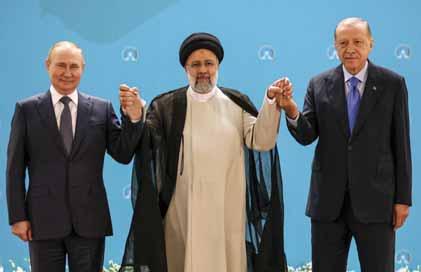
Both cases show the limits of Russia’s reliance on Turkey and Iran. It also shows cracks in the broader Eurasian push against the West.
This naturally does not mean that Moscow will not continue cooperating with Ankara and Tehran. The latter is especially in need of Russia as an instrument to withstand US pressure. Turkey, too, will carry on with its highly self-interested foreign policy. Its recent tilt toward the West is as much conditioned by Russia’s continuing war as Turkish internal political thinking. The difficult economic situation should be alleviated, and the West is a good source of investment. But once it is achieved, Turkey will revert back to its balancing between East and West.
Therefore, Russia’s Asia pivot has its limits. The cracks are there and they are real. Iran and Turkey now sense Russia’s weaknesses and try to advance their respective positions in the Middle East and the South Caucasus. Tensions will be unlikely to disspate any time soon, but the three powers will try to remain pragmatic. Economic, investment and regional geopolitical trends will push Moscow to stabilize ties with Ankara and Tehran.
 INTERVIEW BY VAZHA TAVBERIDZE
INTERVIEW BY VAZHA TAVBERIDZE
The coming disintegration of Russia is not a pastime or a manifestation of "wishful thinking", as admirers of the Putin regime think – writes Juraj Mesik, a Slovak author and scholar. And many a Western European scholar would answer: that is a bold statement. “2023- The Year the Russian Empire Died” is the title of Mesik’s latest book. Radio Free Europe’s Georgian Service sat down with him to talk about Russia today, one which currently occupies one fifth of the largest state in Europe, and the fact that the vaunted sanctions policy has seemingly failed to starve Russians, demolish the Russian economy, or make Putin more pliable.
“On the long term, I think it's pretty clear with the diminishing returns from the export of fuels, oil and natural gas and the coal, that the economy of Russia will go downhill,” he tells us. “And with a very rapid demographic decline, and the change in internal composition of the Russia's Empire’s demographic structure, many other factors are playing in that direction. Now, why I think that the sudden collapse of the Russian Empire is possible - I'm not so old, but I have lived through the fall of communism, the disintegration of Czechoslovakia, and I witnessed the fall of the Soviet Union. And the West was not prepared for any of it - it is very natural that we did not expect the changes, we simply learned to live in a kind of status quo. Even when we did not like that status quo, we considered it a standard and something which would continue. Surprisingly, the Western analysts did not envision the collapse of the Soviet Union. It took them by surprise. So even if I’m wrong, I think that it is absolutely necessary that the Western decision-making politicians are not confronted with the eventual collapse of Russia unprepared. I think that it will happen very soon. Actually, it is already happening. In the future, the historians will say that 2023 was the year the Russian Empire ended, even if it might technically continue, maybe a few more months or even a few more years.
“The Russian Empire's rests on just a few foundation poles, and all of them are very shaky. One is surplus of income from the export of natural resources, the second is their military might, which keeps oppressed nations paralyzed, and third is, of course, the Russian great power mentality there, which I think is paranoia. There is this famous saying that “it’s impossible to understand Russia.” It can be understood, but you have to look at Russia through the eyes of a psychiatrist. It is a society which is a victim of mass psychosis, which lives in a paranoid world, in a parallel universe. And that parallel universe is collapsing. And it will collapse when they suffer major military defeat – fundamentally, throughout history, whenever Russia was defeated, in 1905, in Japan, or in 1817, in the First World War, or in Afghanistan, the Empire was shaken to the ground and started to collapse.”
WHEN YOU SAY THERE IS A MILITARY DEFEAT FORTHCOMING, HOW MUCH IS THIS IMMINENT COLLAPSE OF RUSSIA CONTINGENT ON OUTRIGHT MILITARY DEFEAT IN UKRAINE?
I think it is inevitable. Obviously, we had the expectation that it would be faster, that the Russian army would collapse during the summer counter-offensive of the Ukrainian army. That did not happen yet. From the military perspective, it is not so difficult to understand. But it's very difficult to imagine a scenario under which the Russian army could prevail in this war.
WHAT ABOUT A STALEMATE, WHERE RUSSIA MANAGES TO KEEP SOME PARTS OF DONBAS AND CRIMEA, AND THE OTHER TERRITORIES GO BACK TO UKRAINE ALONGSIDE A CEASEFIRE? WOULD RUSSIA COLLAPSE IN THAT SCENARIO?
That would be a military defeat for Ukraine, but I don't consider it likely. It's really very, very difficult to imagine that Russia will win the war over Ukraine while supported by the coalition of Western countries. Yes, that support is very slow, frustratingly slow. It comes with various limitations, but nevertheless, step by step, it moves forward. I'm pretty sure that Ukraine will liberate their territory, but even the full liberation of the Ukrainian territory is not what I would consider a true victory for Ukraine. Even if they manage to get back to the 1993s borders, that will not be the inevitable end of the Russian Empire: if Russia survives that military defeat as one country, then we will be back to what Germany went through in 1918, when Germany was defeated from the Western perspective, but not from the German perspective. And if the West allows Russia to be defeated, but not in the Russian eyes, then the next generation of Ukrainians and Europeans will likely face yet another war, because revanchism will come to play in in Russia.
The real defeat of Russia will be a breakdown of the Russian Empire. That is the defeat of Russia, and that is victory of Ukraine. Demilitarization and denazification should happen, but in Russia, and that can only really happen after the real defeat of Russia. Otherwise, they do not have internal resources for mental change; they are not able to heal themselves from all those delusions they live in. If they are left alone after a military defeat, they will continue to live in their delusions, they will say that, no, it was not Ukrainians who defeated them, it was the Americans and the internal enemies who backstabbed them. They will simply not accept the new reality and they will continue to live in their delusions.
HOW CRUCIAL IS THE WESTERN RESILIENCE IN ACHIEVING THAT OUTCOME, THE COLLAPSE OF RUSSIA,
The West is certainly able to achieve these goals. The problem is that most of the leaders in the West are not aware of this situation and are not thinking about it. And the purpose of my book is really to catalyze and provoke debate about it. There are masses of academics, of politicians, of diplomats, who learned to deal with Russia, and to play Russian games with Russians, and they became good at it, and their living is based on playing those games. And for those people, learning a new game is not something they can do easily.
VERY
RUSSIA WOULD RESULT IN CIVIL WAR INSIDE RUSSIA, AND THE WEST IS NOT VERY KEEN ON THAT SCENARIO.
The West is not keen on any deep changes. It is the nature of democracies - democracies are very much concerned by big changes. Big changes are forced upon democracies, but people do not vote for them as such. I don't think the collapse of Russia must inevitably be a bloody game. It will be a bloody game if it is uncontrolled and not managed, if the West washes its hands of Russia as it did in the 90s. That's why I said I think the West should be preparing to manage the disintegration of Russia. And the purpose is not to punish Russia for what they did; the purpose is actually to avoid the more tragic outcomes of the freefall disintegration of Russia, which I can imagine would lead to events similar to the 1917 revolution.
YOU WRITE THAT IF THE SOVIET UNION DIDN’T TURN INTO AN ALL-OUT BATTLEFIELD WITH NUCLEAR-ARMED FACTIONS VYING FOR POWER, NEITHER SHOULD THE IMMINENT COLLAPSE OF RUSSIA RESULT IN THAT. IS THAT A FOOLPROOF CONCLUSION?
I think the risk of the nuclear arms is much lower than then. It's difficult to exclude it totally, but it is a very, very low risk. The Western precision weapons are much more advanced. And in the case of the threat of misuse of nuclear weapons, the West is in a position to destroy the Russian nuclear arsenal with conventional precision guided weapons. I think the Western military intelligence knows exactly where those weapons are located, and what is needed to make them inoperable.
AFTER THE BUDAPEST MEMORANDUM 30 YEARS AGO, NOT ALL COUNTRIES GAVE UP THEIR NUCLEAR ARSENAL. HOW DO YOU CONVINCE ALL THOSE NEW STATES THAT WOULD POP UP IN THE EVENT OF RUSSIA'S COLLAPSE TO GIVE THEM UP?
The stick and carrot strategy. If the West states the policy that it will recognize only new states that agree to certain conditions, de-nuclearization being one of them, then the local leaders will be forced to make a decision whether they want to be recognized by the West as an independent country, or whether they want to operate outside of the Western world. And then there are various economic tools and privileges, or lack of privileges. The West can develop very well-functioning tools to push for denuclearization.
HOW MANY NEW COUNTRIES DO YOU ENVISAGE WILL POP UP AFTER RUSSIA'S COLLAPSE?
I think, going from west to east, in the North Caucasus there is a strong tendency towards independence. We know that historically there was a Mountain Federation, short lived, sure, but it was short-lived because the Russian army came. Is it possible to re-establish a New Mountain Republic? That’s a question I don’t have an answer for, but can you imagine Chechens staying in Russia if Russia were to collapse? And once Chechnya becomes independent, it will be a domino scenario for other North Caucasus nations, like Dagestan, which is multi-ethnic but has a sizeable popu-
lation of 3 million. And then Bashkortostan very likely, Tatarstan, and the question is whether Tatarstan would try to become a Federation of the other Turkic and ugro-finn nations of the Volga region or not. The Yakuts apparently have a drive for independence. So those would be my candidates for ethnic states. But then they may be more.
LET'S MOVE ON FROM THE ETHNIC STATES, LET'S SAY SOVEREIGN ENTITIES, TO THE TERRITORIES THAT WOULD GO TO OTHER COUNTRIES. Obviously Kaliningrad, or Konigsberg, to be more precise, is an obvious pick. There’s no reason for the existence of an enclave of the Russian Empire in Central Europe, it’s just a remnant of Stalin's policy. I think a more reasonable approach would be to integrate part of Konigsberg to Poland and part to Lithuania.
Then, further north, you have the occupied territories of Finland - Karelia. And then you have the question of whether even the parts of Russia where the Russian population dominates want to be a part of one whole. I do not see any reason why a citizen of Sankt Petersburg, if the Russian Empire collapses, would necessarily want to exist under Moscow’s rule. It is a large city with the potential for statehood, and history to back those ambitions up.
Then you have the Kuril Islands that are occupied by Russia which were never recognized by the Japanese. After the collapse of Russia, Japan will take over those islands, together with Sakhalin. Then there are territories in the east of Russia that were historically part of China, and if China decides that they want those territories back, I would consider that an absolutely legitimate request.
IF YOU CONSIDER THAT LEGITIMATE, THEN WHAT MAKES RUSSIA'S IMPERIAL WAR OF CONQUEST ILLEGITIMATE? RUSSIA HAS INTERNATIONALLY RECOGNIZED BORDERS. ONE OF THE MAIN ARGUMENTS AGAINST RUSSIA IS THAT IT VIOLATES THE INTERNATIONALLY RECOGNIZED BORDERS OF OTHER COUNTRIES. HOW DOES CHINA DOING THE SAME AGAINST RUSSIA MAKE IT RIGHT?
By declaring parts of Ukraine as Russian territories, officially, through the Russian Constitution, they violated the international order respected for many decades.
And a country which does this chooses to play a game of not respecting international borders, and they should be treated as those who do not respect international borders. It's a fair game. Yeah. Let there be a new status quo after the war, which will then be codified internationally.
FURTHER SOUTH, WE HAVE THE TERRITORIES THAT ARE NOT OFFICIALLY PART OF THE RUSSIAN FEDERATION, BUT WHICH ARE DEFINITELY OCCUPIED BY IT: MOLDOVA'S TRANSNISTRIA AND GEORGIA'S ABKHAZIA AND SOUTH OSSETIA. Those are parts of Moldova and Georgia and that's absolutely unquestionable: they will return to the countries from which they were stolen.
MUSIC TO THE EARS OF MANY MOLDOVANS OR GEORGIANS. BUT LET'S IMAGINE A SCENARIO WHERE RUSSIA DOES INDEED COLLAPSE AND ABKHAZIA, FOR EXAMPLE, SAYS, “WE DON'T WANT TO REJOIN GEORGIA.” WHAT HAPPENS THERE?
With Abkhazia, I think it’s a little bit more complicated. And I do not have a specific answer. I really don’t know enough about the dynamic between Abkhazia and Georgia, but I think that it should return to Georgia, because the independence or quasi independence of Abkhazia was never recognized by the international community,
Without the Russian influence, there will much better conditions for patient negotiation, taking into consideration the needs of refugees who were expelled from those territories. I really don’t know to what degree their national ethnic rights were or were not respected, but I think that without the Russian influence, and with the wise mediation of Western powers, there will be gradual progress towards some settlement and peace accepting.
In 1945, the Germans were a hated nation in Central Europe. Imagine that the Poles and Germans were able to come to peace after what happened there. So I think that the Abkhaz and Georgians, though without really understanding the details of this dynamic, without the Russians continually adding fuel to the fire, will have a very good chance to find gradual settlement.
So that the discussion is not just for the sake of talking, we will try to form or unite some practical opinions. The word "unification" is not accidental, as we have already expressed one or another opinion in previous articles. It should be noted that different opinions on this issue have also been presented in other authoritative works.
This time, to avoid thematic "tautology" and abstractions, and for the sake of practical concreteness, we will outline some important recommendations in light of current events.
Systemic consultative platform: in the past we have repeatedly talked about the need for a qualitatively new, systemcreating format of relations to improve cooperation in the Black Sea region.
In particular, we consider the initiative of the framework document of the Black Sea Declaration as one of the options that would serve the political and economic integration of the countries of the region, including a modern format of consultation and coordination, adapted to the time and needs of new channels of communication.
Such a declaration will emphasize the importance of the Black Sea region for global and regional peace and stability. Along with a number of relevant topics, the declaration will: (1) talk about the partnership of the parties for regional security; (2) express support for the sovereignty and territorial integrity of the countries of the Black Sea region;
(3) emphasize the importance of ridding the region of harmful influences and "zones of special interest"; (4) point out the need to mobilize funds for the diversification of regional infrastructure as well as the need for socially and environmentally sustainable projects in the region; (5) discuss the so-called ethnic conflicts; (6) highlight the need for continued cooperation on pressing regional security issues, whether terrorism, illegal migration, or others; (7) outline directions towards regional free trade agreements and blocs.
In addition to the above, the attention of the declarants will additionally and specifically focus on attracting investments to the region. As one of the concrete initiatives we would consider the declaration of a major regional project, for example, the initiation of a "Black Sea Prosperity (Development) Belt". The project objectives would include mobilization of financial resources for regional infrastructure development, as well as reduction of dependence on certain energy sources, implementation of
targeted social and environmental programs, etc.
We would like to add that for the format to be effective, it will be necessary to hold regular summits at the level of the heads of the declaration's member states, strategic partners and high-level representatives of allies. The main purpose of the regular summits will be to support the independence, sovereignty and territorial integrity of the countries of the region and the realization of other priorities stipulated in the declaration.
NATO enlargement remains on the agenda, and so far only at the level of declarants. In fact, there is no practical movement or procedural gidance on the implementation of the declared principle of "open doors". In this respect, the war in Ukraine has also turned out to be a rather strange event: the realization of the aforementioned principle is sometimes clear and then clouded. Therefore, to date, the foreseeable prospect of the North Atlantic Alliance expanding eastward - into Russia's "near abroad" - is as unclear as the political outcome of this war itself. However, the processes that have unfolded in the greater Black Sea region cannot adjust to procrastination and require political and legal solutions aimed at the resolution of the issue.
One such solution could be the creation of a mini-lateral (multilateral) defense alliance of the region, a kind of regional "small NATO", which we have repeatedly proposed. In general, the formation of small defense alliances tailored to the needs of a particular region is a characteristic of the new format of the global security system, and good examples can be found in the Indo-Pacific and Middle East regions. So, the question arises: is it not time to create a region-specific structure tailored to the security interests and challenges of the region of the Black Sea? This initiative would be especially practically useful for those countries (including Georgia) that cannot take advantage now and may not take advantage in the near future of NATO's well-known Article 5.
We also believe that, in addition to a set of defense measures, the institutional alliance for Black Sea regional security would deepen other areas of cooperation, such as situational threat assessment, intelligence sharing, etc.
In any case, such a systemic solution would help establish a "one flank, one threat, one effort" policy among the region's like-minded countries and their partners towards regional challenges.
In today's world, discussion of economic interconnectedness and the phenomenon of interdependence is an established
given. Based on the objectives of this article, it is not possible to discuss this phenomenon in detail. The only thing we can add is that, due to different circumstances, the quality of such links and relations has been rising and falling: at present, as a result of post-pandemic, war and great power competition, such an economic network is in a process of restructuring and searching for a new point of equilibrium. However, it is better to refer back to our region, for which economic interconnectedness and interdependence are particularly important for preventing military conflicts in the region and achieving relative stability. This phenomenon was originally labeled "peace through trade" and its essence was to meet mutual needs of countries with different political and social structures.
In the greater Black Sea region, such a "need" is more relevant today than ever before. As concrete examples of such "need" of regional interconnectedness and interdependence, two major projects should be considered: the Black Sea Underwater Electricity Cable and the Anaklia Deep Sea Port. The successful realization of the Middle Corridor project with corresponding political and economic dividends for our country and the region will be a continuation of the same approach. Apart from the direct effect, the implementation of these and other regional connectivity projects is the best response to the destructive actions of the Russian Federation. The fact is that Russian destructiveness is not only manifested
in military aggression. It is also aimed at putting the Black Sea region under such pressure that foreign investments will lose any incentive to enter the region. And the disappearance of the region from the investment radar would not only threaten the economic development of the countries concerned; It would throw the region out of a healthy economic structure connecting Europe and Asia, and bring logistical routes under the influence of revisionist regimes. And finally: large and ambitious investments in the infrastructure of the greater Black Sea region will be exactly in line with security in the modern sense, unthinkable without economic self-sufficiency and sustainability.
Georgia should not only adapt to the emerging system of regional security of the Black Sea, but also become an indispensable creator of this system. To some, such a formulation may seem bold. We agree that yes, it is bold. Nevertheless, this statement has its justification and explanation: (1) the justification lies in the reasoned ambition that is so necessary for a small country to be competitive, and (2) the explanation is the historical functionality called the political-geographical component of Georgia, and our country is obliged to make a tenfold effort in this regard. Obviously, we are well aware that it is practically impossible to accomplish this task relying only on our own resources (due to the scarcity of such resources).
However, there are several fundamental factors that contribute to the multiplication of our resources at the expense of partners and allies, namely the fact that Georgia: (a) is a pro-European country;

(b) has the status of a "partner with enhanced opportunities" of the North Atlantic Alliance in the region and operates within the framework of the renewed NATO-Georgia core package; (3) connects (and will further connect in the future) the West and the East with important transportation and logistics links on its territory; (4) by further strengthening ties with the West, creates an opportunity to better project Western interests in the region, which is a subject of rationally coinciding and reciprocal interests of the country and its allies. We believe that only with a systematic approach and large-scale thinking can the Georgian state have real claims to establish a place in the desired format of relations in the Black Sea region. And the efforts aimed at this equally pass through the sanity and health of the political process within our country. The time has come to clearly show both to ourselves and to the outside world that we have both the moral right and the practical opportunity to make our own unique contribution to regional security and stability. And for this purpose, a nationwide consensus, the unity of healthy political and public forces and a transition from the "businessoriented" Georgian politics to a practical agenda of national state development are needed more than ever. The sooner, the better.
The income from international tourism amounted to $1.8 billion in six months, the National Tourism Administration reported this week, and “unprecedented” increase.
“According to the data of January-June 2023, Georgia received 1,804,529,935 dollars in income from international travel (tourism), which is a 123.9% recovery of the same indicator of 2019 (+348,461,374 USD).

“Compared to 2022, revenues from international travel increased by +661,999,720 (+57.9%) USD.
“This year, the second quarter of international travel revenue exceeded the same figure in 2019 and reached $1,009,112,957, which is a 115% recovery from the same period of 2019.
“Compared to the second quarter of 2022, revenues from international travel have increased by +260,291,106 (+34.8%) US dollars,” the information reads.
This is the second Real Estate article by Legal Columnist Daniel Klein. Last week’s article was about buying a second-hand flat, and the next article, Part 3, will discuss the basics of renting a flat in Georgia.
There is no shortage of very residential construction projects in Tbilisi, and especially in the Black Sea seaside resort of Batumi. On paper, some look absolutely magnificent; tempting and modern, with very enticing prices compared to other popular destinations. It is possible to find luxury offers for as little as 1000 USD per square meter.
If working through a broker, the investor needs to take into account the likelihood that the broker is receiving a commission from sellers and might steer the investor to the projects where commissions are highest. This raises a conflict of interest since, if the developer happens to have a dodgy reputation, perhaps the broker will avoid revealing such. Whether finding a project through a broker or through their own efforts, it is always advisable to try to conduct both a quick legal review and market reputation review.
As far as the legal review is concerned, it might be a good idea for a lawyer to see if the developer has had any litigations and even check the development prospectus, the investment agreement and other issues that may not be obvious to an investor. One of the main points might be to understand what happens if there are any project delays.
The agreement executed with the developer is a pre-purchase agreement, since it is not possible to conclude a real estate purchase agreement on a property that does not yet exist. Buying an offplan property is associated with a higher risk, since the developer might not fulfill their obligations. This breach by the developer may be intentional (perhaps they never intended to start and/or finish the construction works) or unintentional (i.e., due to poor planning and/or other reasons, the developer went bankrupt or is unable to complete the construction).
In case a developer breaches their obligations, there is not much you as a buyer can do. Therefore, it is important that you find a trustworthy developer, with a good track record and reputation.

Klein & Pantsulaia Special Counsel in Georgia (a former lawyer in the construction industry) says: “It is of utmost importance to engage a developer whose project completion is not contingent on the sale of premises. Opt for a developer who secures financing through a reputable banking institution, ensuring the project's timely completion, irrespective of the pace at which premises are sold.' In other words, don’t finance a developer’s projects if possible: It’s just too risky!
This is really crucial when making these
types of investment decisions, and if you are a weekend tourist spuriously making an investment, it might be difficult to know how to vet developers and projects. There are various forums on social media which might be useful when trying to understand a developer’s reputation, but the best thing to do is to find an inde-
After a 30-year hiatus, the Khabarovsk machine-building plant Дальэнергомаш has resumed supplying equipment to Georgia –TASS wrote this week.
Дальэнергомаш has not specified from whom it received the order, but it writes that its equipment is being supplied to a chemical plant in Georgia that produces mineral fertilizers.
“For the first time in the last 30 years, the factory received an order from Georgia. A nitrogen gas generator will be sent to a chemical plant that produces mineral fertilizers. Also, in 2023, the company

has sent equipment to metallurgical plants in India and Kazakhstan,” the statement of the Russian plant says. Дальэнергомаш manufactures compressors, pressure and electrical equipment for metallurgical complexes and chemical industry plants. The company supplies equipment to dozens of countries, including Belarus, Bulgaria, India, and Iran.
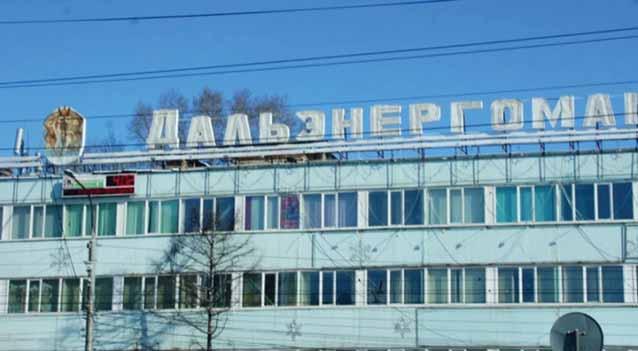
pendent real estate advisor (and an expat one if possible) who knows the players and their respective track records. Generally speaking, Georgian developers are very reliable and usually deliver what is promised, although often with delays, as with most construction projects in any country. It is advisable to try to find
other finished projects of a given developer (assuming this is not their first) to take a layman’s look at the quality of the finished product. Unlike in many countries, real estate development projects in Georgia are not regulated, and the last thing an investor wants is to have to bring legal action against a developer.
The US Embassy Tbilisi released a statement on social media this week saying that the American leadership is happy with the fact that the export of blueberries from Georgia is growing steadily. Last year, the profit exceeded 14 million dollars.

“Blueberry exports from Georgia are growing steadily, and last year alone, profits exceeded $14 million. This is gratifying for the US government, as
since 2018 we have been supplying blueberry growers with modern technologies and skills. As a result, we get more jobs and increased income for people in the regions.”
“During her visit to Guria, US Ambassador Degnan visited one of the largest blueberry producers and toured the US Government-supported cold storage facility. Through this cold storage, Blueberry Farm Ltd, which has its own production, will purchase crops from neighboring producers.
“30% of the cold storage facilities in Georgia were created with the support of the United States.”
The Asian Development Bank (ADB) and Joint Stock Company Georgia Capital (GCAP) partnered to issue GCAP’s inaugural sustainability-linked bond. As a strategic investor, ADB provided foundational support to adopt this innovative instrument. This is ADB’s first subscription to a private sector sustainability-linked bond.
GCAP’s total issuance of $150 million with a 5-year tenor is the largest bond listed on the Georgian Stock Exchange and the largest sustainability-linked issuance in Georgia and the Caucasus, to date. ADB will invest $16 million, and the proceeds will be earmarked for refinancing renewable energy and education investments, and for financing corporate measures to achieve the group’s sustainability-linked key performance indicator.
“This investment builds on ADB’s commitment, as Asia and the Pacific’s climate bank, to develop capital markets in ADB’s developing member countries through innovative and path finder issuances, especially in the climate and sustainability space,” said ADB Director
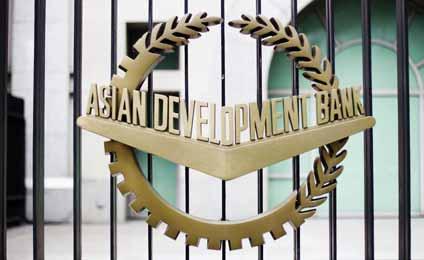
General for Private Sector Operations
Suzanne Gaboury. “ADB’s long-standing partnership with GCAP provided the opportunity to propose the issuance of this sustainability-linked instrument. The sheer size of this issuance and the healthy private sector demand it managed to generate, is expected to spur further climate-related bond issuances in Georgia and throughout the Caucasus region."
Sustainability-linked bonds are forwardlooking, performance-based debt instruments with climate-related objectives that are measured through predefined key performance indicators and are assessed against sustainability performance targets. Second-party opinion on the credibility of bonds issued was provided by Sustainalytics, based on the issuer’s sustainability-linked bond framework which is aligned with the International Capital Markets Association’s Sustainability-linked Bond Principles.
This issuance is critical to GCAP achieving its goal of being net zero in its operations by 2050. A key feature of the sustainability-linked bond is GCAP’s
commitment to reduce its greenhouse gas emissions by 20% by 2027 compared to the 2022 baseline. This will also support Georgia’s commitment under the Paris Agreement to reduce GHG emissions to 35% below 1990 levels by 2030. This landmark transaction has mobilized an unprecedented $83 million of private
sector investors for a Georgian-listed corporate bond.
“Georgia Capital has pioneered corporate commitments to net zero, and we continue to support our country’s efforts to transition to a carbon-neutral economy,” said Georgia Capital Chairman and Chief Executive Officer Irakli Gilauri.
“This bond will also support the development of the local capital market and promote the use of sustainable finance instruments and standards in the region. It will enhance our financial flexibility and provide an opportunity to continue with substantial deleveraging. We are thankful for ADB’s support and look forward to further collaboration on climate investments.”
GCAP is one of the largest private investment companies in Georgia. Its diversified portfolio includes investments and operations in banking and insurance, health care, renewable energy, water utility services, education, and housing and hospitality. Georgia Capital PLC, the parent company of GCAP, is listed on the London Stock Exchange. ADB and Georgia Capital’s portfolio companies have worked together in several transactions since 2019.
ADB is committed to achieving a prosperous, inclusive, resilient, and sustainable Asia and the Pacific, while sustaining its efforts to eradicate extreme poverty. Established in 1966, it is owned by 68 members—49 from the region.

The re-export of cars imported from the US to Russia and Belarus was prohibited from the territory of Georgia from August 1 as per the sanctions imposed by the US and the European Union, the Revenue Service announced on Wednesday.
On top of that, the re-export of cars imported from the European Union to
Russia and Belarus will be banned from September 26, as provided for by the 11th package of imposed sanctions against Russia, the Revenue Service added. As part of the sanctions imposed on Russia to date, the export of cars worth more than 50,000 euros was limited to Russia, while the 11th package of sanctions applies to cars with an engine capacity of more than 1.9 liters, as well as electric and hybrid cars.

Continued from page 1
“As a result of the agreement signed today, the quality of coverage will be significantly improved, customers will have high internet speed throughout the country, and the network capacity will be adapted to the growing demand for data traffic. This agreement is also a preparation for the development of the 5G network. Our long-term partnership with Nokia and the company's strong network equipment portfolio made it easy for us to decide to deepen cooperation with Nokia.”
Cellfie Mobile's ambitious vision for a future-proof network led them to ink this critical deal with Nokia. The agreement focuses on deploying Nokia's state-ofthe-art 5G AirScale portfolio, featuring the energy-efficient ReefShark Systemon-Chip (SoC) technology. The upgrade will involve the modernization of existing base stations and the construction of new ones, all specially designed to accommodate 5G technology.
Nokia's intelligent MantaRay network management system is also part of this collaboration. With advanced AI functionality, the system will streamline network operations, ensuring optimal performance, and improved monitoring capabilities. This forward-thinking approach will empower Cellfie Mobile to deliver a superior user experience and cater to the ever-increasing demand for data traffic.
With the conclusion of the network auction, Nokia will introduce new 5G (3.5 GHz) base stations throughout Georgia. This move will position Cellfie Mobile as
a pioneer in providing advanced 5G services to its customers. 5G technology is poised to revolutionize the way Georgians experience mobile communication, offering lightning-fast internet speeds and enhanced connectivity across the country.
Cellfie Mobile users can look forward to a transformative experience as the implementation of these upgrades begins in November 2023. High-quality communication, fast internet speeds, and seamless broadband coverage will become the norm for customers. This will empower Georgian businesses, students,
and individuals with unprecedented access to data and opportunities for innovation.
The collaboration between Cellfie Mobile and Nokia is a testament to CBS Group's unwavering commitment to providing the best mobile connection in the country. The group has prioritized investments in network stability, quality, and reliability, culminating in the formation of Cellfie Mobile as a fully Georgian mobile operator and a new Georgian brand.
"Today is another clear example of CBS Group delivering on its promise," notes
Tamar Gakharia, financial director of CBS Group. “At the launch of the new brand in April, we told Cellfie's 1.45 million customers that CBS would invest this year in improving the sustainability, quality, and reliability of Cellfie's network. Within the framework of the same investment strategy, one of the largest deals in the Georgian market has already been concluded, as a result of which, in the form of Cellfie, a fully Georgian mobile operator was formed. Now, with the prospect of future development of 5G technology, CBS Group continues to
work to provide the best mobile connectivity in the country. Right now, it is impossible to say exactly how much money will be invested in this project, although it is set to be several tens of millions of dollars.”
The partnership between Cellfie Mobile and Nokia is not only groundbreaking for Georgia's mobile sector but also a reflection of a longstanding relationship between the two companies. Nokia, as an important and trusted client, is proud to deepen its collaboration with Cellfie Mobile to bring the benefits of 5G technology to Georgian users.
"Cellfie Mobile is an important and long-standing client for us,” says Demetrio Russo, Nokia's vice president for Turkey and Central Asia. “We are proud to have the opportunity to further deepen our long-term partnership with the company, both by enhancing its existing network portfolio and by laying the groundwork for its 5G network deployment. We look forward to the completion of the project and the positive impact it will have on Cellfie users.”
As the world embraces the era of 5G technology, Cellfie Mobile's partnership with Nokia signals a remarkable leap forward for Georgia's mobile network infrastructure. With cutting-edge technology and advanced AI-driven network management, Cellfie Mobile is ready to provide a seamless, high-speed, and reliable mobile experience to millions of Georgians. The future of mobile communication in Georgia looks bright, and this collaboration stands as a shining example of progress and innovation in the telecommunications industry.
Carrefour, owned and operated by Majid Al Futtaim in Georgia, has been at the forefront of mass retail for over six decades. With an unwavering commitment to customer satisfaction and offering a wide range of products at competitive prices, Carrefour has made a significant impact on the retail industry worldwide. As part of its expansion strategy, Carrefour is now offering a lucrative franchise opportunity in Georgia, allowing aspiring entrepreneurs to become part of the internationally recognized brand. In this article, we explore Carrefour's franchise initiative, the benefits it offers to franchisees, and the company's vision for empowering local businesses in Georgia.
The initiative allows entrepreneurs to partner with Carrefour and operate Carrefour City stores. These minimarkets are designed to cater to the daily shopping needs of customers, offering fresh food, beverages, groceries, and dairy products in a convenient and modern setting.
“Today, we are inviting entrepreneurs to become Carrefour’s partners in Georgia and to run Carrefour City stores with us, as we continue to offer exceptional purchasing conditions and deliver a unique loyalty program that caters to the needs of the population. We remain committed to onboarding entrepreneurs, helping them develop their local businesses and grow together with one of the world’s largest hypermarkets and supermarket chains. Carrefour’s awareness in Georgia enables them to build a profitable, longterm investment,” stated Jerome Akel, Country Manager of Carrefour Georgia. The benefits of becoming a Carrefour franchisee include:
• Joining an internationally recognized
brand: By becoming a Carrefour franchisee, entrepreneurs can leverage the brand's global reputation and recognition. Carrefour's long-standing presence and reputation for quality and affordability make it an attractive option for customers in Georgia.
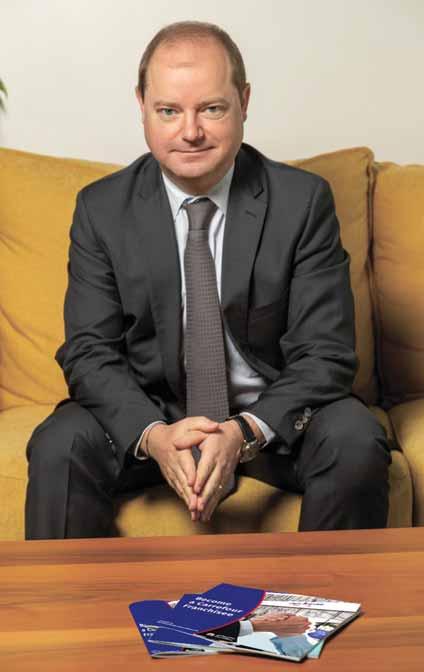
• Long-term and profitable investment: Carrefour offers franchisees the opportunity to build a sustainable retail business. With a well-established supply chain and efficient logistics, franchisees can enjoy the benefits of a proven business model.
• Access to a wide range of products: As a Carrefour franchisee, entrepreneurs gain access to a diverse product portfolio at wholesale prices. This allows them to offer customers a comprehensive selection of both local and imported products, catering to various preferences and demands.
• Private label products: Carrefour carefully selects its suppliers and monitors their adherence to international standards. Franchisees can take advantage of Carrefour's private label products, which are known for their quality and reliability.
• Unique customer loyalty program and promotional events: Carrefour's MyCLUB loyalty program is a key selling point for franchisees. This program unites over 360,000 customers in Georgia, offering personalized promotions and saving opportunities, enhancing customer retention and loyalty.
• Marketing support: Carrefour provides marketing and advertising support to franchisees, including high-frequency advertising on various media channels. Franchisees can benefit from the brand's strong marketing presence to attract customers to their stores.
To become a Carrefour franchisee in Georgia, entrepreneurs are offered two options:
• Convert an existing store: If an entrepreneur already owns a retail store, Carrefour can assist in transforming it into a Carrefour City brand. This conversion
promises to attract more customers, drive increased sales, and generate higher profits.
• Open a new store: For entrepreneurs who do not possess an existing store or suitable real estate, Carrefour provides the expertise and support to establish a new retail business. This presents an opportunity for individuals passionate about grocery retail to embark on a successful entrepreneurial journey.
Carrefour City stores are ideally situated in convenient locations such as city or district centres, popular tourist destinations, residential areas, and trade centers. The store's street-level entrance on a crowded pedestrian road adds to its visibility and accessibility, attracting footfall and potential customers.
Carrefour offers extensive training and support to franchisees through its Retail Sales Business School in Georgia. This program aims to enhance the technical and functional capabilities of franchisees, empowering them to run successful retail operations. From upskilling and reskilling to gaining new expertise, Carrefour ensures that franchisees are well-equipped to meet customer expectations.
“We employ thousands of people in the country. Today, we have more than 3,500 direct colleagues and 6,000 indirect colleagues. Every new store creates more job opportunities for the local community,” Akel added.
Carrefour's franchise initiative in Georgia provides a unique and lucrative opportunity for aspiring entrepreneurs to become part of a globally recognized brand. With access to a wide range of products, private label offerings, and a strong customer loyalty program, franchisees can establish a profitable retail business while delivering high-quality products and services to the Georgian community. By supporting local businesses and empowering entrepreneurs, Carrefour's franchise initiative reinforces its commitment to the growth and prosperity of Georgia's economy.
The ongoing argument about the prospect of Georgia’s development has us contemplating whether this country should take an economic direction, oriented toward the service industry, or should rather give preference to selling its intellectual capabilities and scientific achievements to the world beyond. The ideal option might be a double-barrel approach, if we can afford it, though looking both ways simultaneously could be a little problematic at this point, because we are right now in bad need of some “quick cash” for people’s general comfort. It is funny that in those bad soviet times, scientific research as such was almost the number one priority in the state budget of the country, whereas in modern good times, science has acquired the role of a poor cousin of our economics.
Against this somewhat uncomplimentary background, news came out of the blue about the appearance of a new monograph by Giorgi Kvesitadze, Professor and recently retired President of the National Academy of Sciences of Georgia, the author of more than 150 publications on environmental science, chemistry, microbiology and biotechnology, and Professor Alexander Potemkin, a citizen of Germany, investor in scientific and commercial projects, writer, environmentalist, author of more than 30 monographs and several critiques.
The authors, who definitely make the world a better place with their wonderful cooperation, want to believe that the results of their research will arouse scientific interest and find practical application in global academic circles. Their hope is well-founded, and is strong enough to overpower the proclivity of todays’ world rulers to unleash their appetites for solving humanity’s ills by saber-rattling rather than peaceful, scientific means.
The book is titled ambitiously ‘Homo Sapiens and the Technogenic Environment’. It reconnoiters the current environmental problems, doubtlessly conducive to a disaster, affecting all living organisms on our planet, with research conducted by the authors describing the dire environmental conditions in which the dwellers of Planet Earth find themselves at risk of inevitable extinction due to their rampant consumerism and disregard for reasonable environmental exigencies. It then presents an environmental concept on a worldwide scale designed to delay by several decades said disaster. This outstanding work establishes the planet's resource potential and all of its vital supplies- water, gas, oil, basic minerals and fertile soil, discussing the ways to modify our lifestyles under the present conditions. The authors present and statistically corroborate the most important facts, directly related to humanity's immediate future:
The planet's capacity to satisfy the demands of it human consumers is running out; the global population is increasing at an annual rate of 80-100 million
people, and as such, it is obvious that an environmental disaster is on the horizon.
The monograph proposes a new innovative technology for purifying biological niches from toxic substances as a way out of this critical situation. The enormous importance of the problem has prompted concern about the fate of the planet, and the innovativeness of the solutions presented can hopefully make a practical contribution to saving the human species.
Incidentally, and of course delightfully, this was all revealed through recent correspondence between the well-known natural science researcher Michael Murphy and Lord David Owen, the famous British politician and physician. It was thanks to their priceless evaluation of this significant scientific study fact that the remarkable effort of the authors became known to the world in good time, to the benefit of us all, the living and future inhabitants of the Earth.
Concerning Academician Giorgi (Otar) Kvesitadze, now 81 years of age, this Georgian science guru has spent his entire long and interesting life totally immersed in deep and meaningful biological and biochemical scientific research, never forgetting that there is regular human life around, full of sports and cultural activities, cherished traditional values, friends and family that had to be taken care of, and love for fellow humans that had to be attended to. Based on his life’s philosophy and the belief in his own strengths and endeavors, we can rightfully expect many more valuable monographs by him for us to read and enjoy.
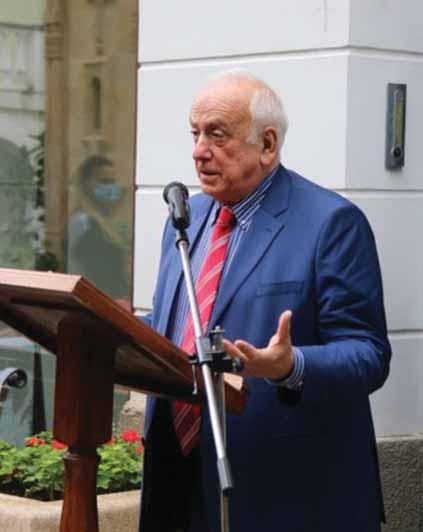
You might see what I see, and recognize it, and name it, with no prompting. Or I might tell you a subject before you see the photo, and you see it, immediately or eventually. Or you might not be able to see it at all, my least preferred choice. This would mean that only I “get it”, which sounds a bit crazy. But such is the nature of pareidolia, about which I have written before: The Greek word meaning to see ordered shapes, recognizable things, in the randomness of nature. Clouds, shadows, reflections, showing faces, animals and more.
I wrote in the notes for a book I am working on a short list of images I was still lacking, to go with the stories in the book; and also a list of stories yet to write from certain images. The former included a dragon of cloud. On the morning of July 24, 2023, this image was fulfilled, as I looked out an upstairs window of our Etseri house in upper Svaneti and shot, once every few seconds or so for nearly an hour, the rapidly changing clouds racing across the sky in front of and over the “mountain wall” across the Enguri river from us. Winds were dragging wisps around, some breathlessly fast, others
behind them slow and stately, some curling around themselves in spirals. The light, too, changed from moment to moment as sunlight lit up sections of the wall for instants at a time. There was no time to waste. But eventually, a cloud bank rolled in and obscured everything for a while. I retreated, until the next spectacle began, an hour or more later, several times throughout the day.

I wondered: would it come today, answering the presentiment and hope I had? And, would I “shoot first and ask questions later”, or see first, know what I had, and shoot as quickly as I could, hardly daring to believe? It turned out to be the both: I saw some of the dragons coming and was ready; others took me by surprise later as I reviewed my digital images. It does happen that I see something afterwards on the computer screen, in post-processing, having shot it much earlier: this was even the case with the Grandparents in front of Ushba, the first story I wrote on this theme. But how much of the time are the clouds playing with forms unseen by even a single sentient observer! Person-years, decades, can go by with not one person on earth looking up, or out, and noticing. Being prepared, and taking the time, goes a long way. There was something in my mind’s eye, not cartoonish or funny, but serious; an amalgam perhaps of all the dragons I have seen illustrated
in many different cultures of the world. And here it came (on several separate occasions, even; one with a clear eye, the others not); and I made its photographic portrait in the seconds before it changed entirely into something my vision simply failed to parse at all, just clouds.
I knew that I was seeing what I had been seeking, and not seeing other things,
or at least not noticing them. So there is an element of filtering going on, more mental than visual processing. Someone else at my side might have seen, unprompted by me, completely other things from what I discovered. But I treasured what came to me, recorded it, and was glad. The book is forming, images and stories together in symbiosis. Seek, and see.
Tony Hanmer has lived in Georgia since 1999, in Svaneti since 2007, and been a weekly writer and photographer for GT since early 2011. He runs the “Svaneti Renaissance” Facebook group, now with nearly 2000 members, at www.facebook.com/ groups/SvanetiRenaissance/
He and his wife also run their own guest house in Etseri:
www.facebook.com/hanmer.house.svaneti
Minister’s Human Rights Advisor, in close cooperation with the UN, including in the framework of the EU HumanRights4all program. The strategy was endorsed by the government just ahead of the Association Council meeting and is awaiting parliamentary adoption. However, the process lacked thorough consultations with the international partners’ and civil society. A dialogue on the development of a comprehensive action plans to implement the National Strategy is ongoing. The EU has put forward suggestions aiming at integrating issues that had not been included in the strategy, such as addressing discrimination based on sexual orientation and gender identity, hate crimes and judicial matters.
field is complemented by ongoing Regional EU program EU4Gender Equality for the Eastern Neighborhood countries of total budget EUR 8 million.
Reforms of the judiciary was supported via the EU-funded Program for Good Governance PGG II implemented by Council of Europe. The components implemented in Georgia provided support to the judiciary, to court administrators, collection of statistics, High School of Justice, Supreme Court, Independent Inspector and others.
The European Union this week published the 2022 report on the state of human rights and democracy in the world.
According to the report, overall, Georgia has a solid human rights framework, including in legislation and policies in line with international and European standards. However, implementation should be strengthened in several areas, it says.
“Overview of the human rights and democracy situation: Georgia applied for membership of the European Union in March 2022. The European Council recognized the European perspective of Georgia in June 2022 and stated its readiness to grant the status of candidate country once the priorities specified in the Commission’s Opinion on Georgia’s membership application have been addressed. These priorities include issues related to the strengthening of democratic principles, the rule of law and
human rights obligations.
“Overall, Georgia has a solid human rights framework, including legislations and policies in line with international and European standards. However, implementation should be strengthened in several areas. In 2022, progress was achieved in the reforms of the electoral system, of the public administration, the enhancement of gender equality, the rights of the child, and the rights of persons with disabilities. Further efforts are still needed in the area of judicial reforms, anticorruption, and strengthening the independence of state institutions. The human rights situation in Georgia’s breakaway regions of Abkhazia and South Ossetia remains concerning.
“EU action – key focus areas: EU action in Georgia is guided by the Association Agreement and the EU Action Plan for Human Rights and Democracy 2020-24.
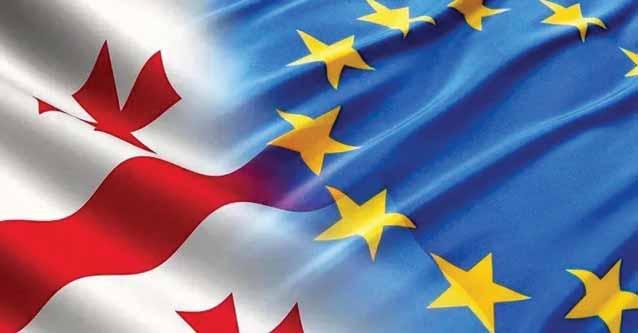
In 2022, the EU focused on strengthening the independence and accountability of the judiciary, reducing inequalities,
contributing to the fight against discrimination, and empowering civil society to promote and defend their civic rights. The EU advocated and provided support to the realization of the rights of the child, the rights of persons with disabilities, the advancement of gender equality, and the fight against gender based and domestic violence. The EU also focused on advocating for the protection of the rights of the LGBTI community, including their right to freedom of association.
“EU bilateral political engagement: The EU engaged in regular political dialogue with Georgia throughout 2022 including on human rights issues. The EU-Georgia Association Council took place in September 2022 and the annual EU-Georgia Human Rights Dialogue in June 2022. The EU deployed significant efforts to encourage Georgia to develop the Georgian National Strategy for the Protection of Human Rights for 2022-2030. These included regular meetings with the Prime
“EU financial engagement: The EU Delegation continued to be at the forefront of protecting and promoting human rights in Georgia through implementing substantial human rights programs and systemic outreach activities. Key assistance has been implemented through the ‘EU4Human Rights’ (EUR 11 million). Its overall objective is to strengthen human rights protection, including the rights of minorities and vulnerable groups, the fight against violence against women and domestic violence, internal and external oversight of law enforcement, protection of privacy, child rights and the support to victims of domestic violence. Throughout 2022, the EU Delegation has maintained its support for civil society as powerful agents of good governance and socioeconomic growth. In the framework of the EIDHR Country Based Support Scheme (CBSS) for Georgia, Civil Society Organizations implement grants on issues encompassing social and economic rights of ethnic minorities, rights of persons with disabilities, the right to health, the promotion of gender equality in the workplace as well as equal, free and fair elections in Georgia.
“The EU bilateral assistance in this
“Multilateral context: Georgia continued its multilateral engagement throughout 2022. It was elected Member of the UN Human Rights Council for 2023-2025. In March 2022, the Human Rights Council adopted a resolution on continued technical assistance by the United Nations High Commissioner for Human Rights focused on the human rights situation in Abkhazia and the Tskhinvali region/ South Ossetia. Through the resolution presented by Georgia, the HRC requested the High Commissioner to present an oral update and a written report on developments relating to the human rights situation in the two breakaway regions.
“On 9 June, the UN General Assembly adopted by vote, for the 15th time, the Georgian resolution ‘Status of internally displaced persons and refugees from Abkhazia, Georgia and Tskhinvali region/ South Ossetia, Georgia.’ During the year, Georgia was also reviewed by the Human Rights Committee, monitoring compliance with the Convention on Civil and Political Rights and the Committee on Ending Racial Discrimination. In these dialogues with Georgia, the respective UN Treaty Bodies expressed concern over the human rights situation in the Georgian breakaway regions of Abkhazia and South Ossetia, including in relation to violations of the right to life, liberty and security, freedom of movement, and further challenges in the context of the COVID pandemic,” the report reads.
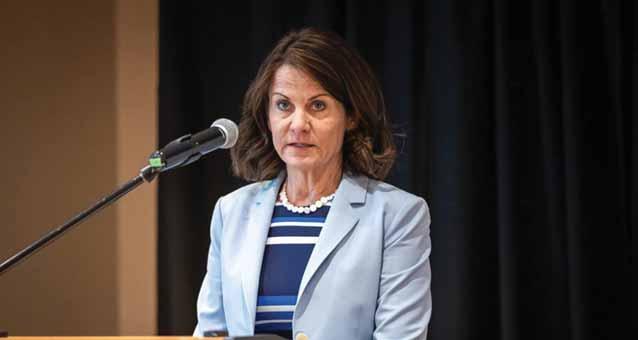 BY TEAM GT
BY TEAM GT
The US Senate supported the appointment of Robin Dunnigan to the position of US Ambassador Extraordinary and Plenipotentiary to Georgia by oral vote. Dunnigan will replace Kelly Degnan in the said position.
Dunnigan previously served as Deputy Assistant Secretary of State for Central and Eastern Europe in the Bureau of European and Eurasian Affairs. Prior to this assignment she served as Chargé d’Affaires, a.i., and Deputy Chief of Mission of the U.S. Embassy in Vienna, Austria. Previously, Dunnigan was Deputy Assistant Secretary in the Bureau of Energy Resources. Earlier assignments include U.S. Embassies in Vietnam, Chile, Turkey, Cuba, and El Salvador.
“Georgia has made significant progress over the past 30 years, but some worrying developments show that there is still much to be done. The EU has provided Georgia with a road map of reforms it must complete this year to obtain EU candidate status. If approved, I look forward to supporting Georgia in implementing these reforms,” she said in an interview in March.
Dunnigan noted that her final priority will be advocacy of Georgia’s sovereignty and territorial integrity.
“I am committed to working with Georgia and our international partners to ensure Russia fulfills its obligations under the 2008 ceasefire agreement and the UN Charter. Our partnership has benefited both the people of Georgia and the US for the past 30 years. Georgia has been a staunch NATO partner for peace since 1994 and has been the largest nonNATO contributor of forces in Afghanistan, next to US troops,” stated Dunnigan.
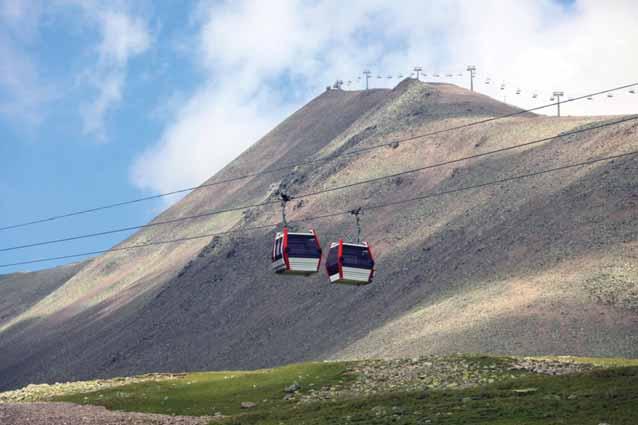 BY MARIAM GORKELASHVILI
BY MARIAM GORKELASHVILI
According to the application published on the State Procurement Agency’s website, plans are underway to construct two new ropeways in the scenic Gudauri region. The project will be spearheaded by MTA, a company under the Ministry of Economy’s jurisdiction.
Currently, Gudauri operates only one gondola-type cable car, which is consistently overwhelmed during the winter season and struggles to meet the increasing demand. To address this issue, the government intends to install two additional cable cars in the area. MTA’s primary objective is to offer visitors a seamless ascent to Mount Vartsla through these cable cars, with the new infrastructure being designed to serve up to 1,800 people per hour.
Due to the urgency of the project, the decision has been made to sign a contract with a supplier without conducting a tender process.
“The development of sports tourism is defined as one of the country’s priorities; as proof, Georgia hosted the World Championship (Bakuriani 2023) at the highest level, in freestyle snowboarding and freeski, therefore, it took an honorable place on the world map in the direction of winter tourism and sports,” a Ministry of Economy statement reads. “The successfully held championship brought the attention of
the FIS to Georgia, and that is why the decision was made by the FIS to include Georgia, specifically Gudauri and Bakuriani, in the annual calendar, among the leading countries, and now for the first time in Gudauri the stage of the international World Cup will be held in Snowboard Cross. which the International
PUBLISHER & GM
George SharashidzeCOMMERCIAL DEPARTMENT
Commercial Director: Iva Merabishvili
Marketing Manager: Natalia Chikvaidze
EDITORIAL DEPARTMENT: Editor-In-Chief: Katie Ruth Davies
Skiing Federation confirmed in the annual sports calendar. The mentioned fact is very important, both for the development of winter resorts and sports, and for the promotion of Georgia.
“The implementation of the measures stipulated by the decree will contribute to the development of the mountain-ski
Journalists: Ana Dumbadze, Vazha Tavberidze, Tony Hanmer, Emil Avdaliani, Nugzar B. Ruhadze, Michael Godwin, Mariam Gorkhelashvili, Mariam Mtivlishvili, Erekle Poladishvili
Photographer: Aleksei Serov
resorts of Georgia, the encouragement of economic activity, the creation of additional jobs and the establishment of a competitive and stable investment environment in Gudauri. In addition, the construction of two new chairlifts on Mount Vartsla and the corresponding infrastructure will diversify the services
Website Editor: Katie Ruth Davies
Layout: Misha Mchedlishvili
Webmaster: Sergey Gevenov
Circulation Managers: David Kerdikashvili, David Djandjgava
in the Gudauri resort, which will contribute to the rapid development of the resort, the improvement of the existing infrastructure and, accordingly, the increase in the popularity of the resort both inside the country and abroad, which will positively affect the awareness of Georgian mountain and ski resorts and increase their competitiveness at the international level. Taking into account the above, the company’s goal is for the mountain-ski resorts in Georgia to improve the level of management and reach international standards in the field of safety and service, which will contribute to getting a proper experience, creating a pleasant and favorable environment for visitors, and increasing their confidence. The construction of new, modern high-standard and high-capacity cableways and ski tracks in the Gudauri resort will have a direct proportional impact on the income of the local population, small and mediumsized businesses, investors, the company and the state.
“Based on the above, taking into account the growing number of visitors and the promotion of international events, it is advisable to organize chairlifts in New Gudauri. The company developed a technical task and determined the criteria and characteristics, according to which two cableways of approximately 1249 and 1369 meters in length should be implemented, which will start from New Gudauri and end at the front slope of the trails, with 6-seater shielded (“Babliani”) cable cars with a capacity of no less than 1,800 people per hour,” the statement said.
ADDRESS 1 Melikishvili Str.
Tbilisi, 0179, Georgia
Tel.: +995 32 229 59 19
E: info@georgiatoday.ge
F: GeorgiaToday
ADVERTISING & SUBSCRIPTION
+995 555 00 14 46
E-mail: marketing@georgiatoday.ge
Reproducing material, photos and advertisements without prior editorial permission is strictly forbidden. The author is responsible for all material. Rights of authors are preserved. The newspaper is registered in Mtatsminda district court.
Reg. # 06/4-309
